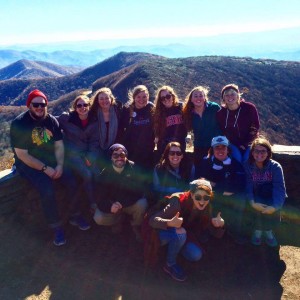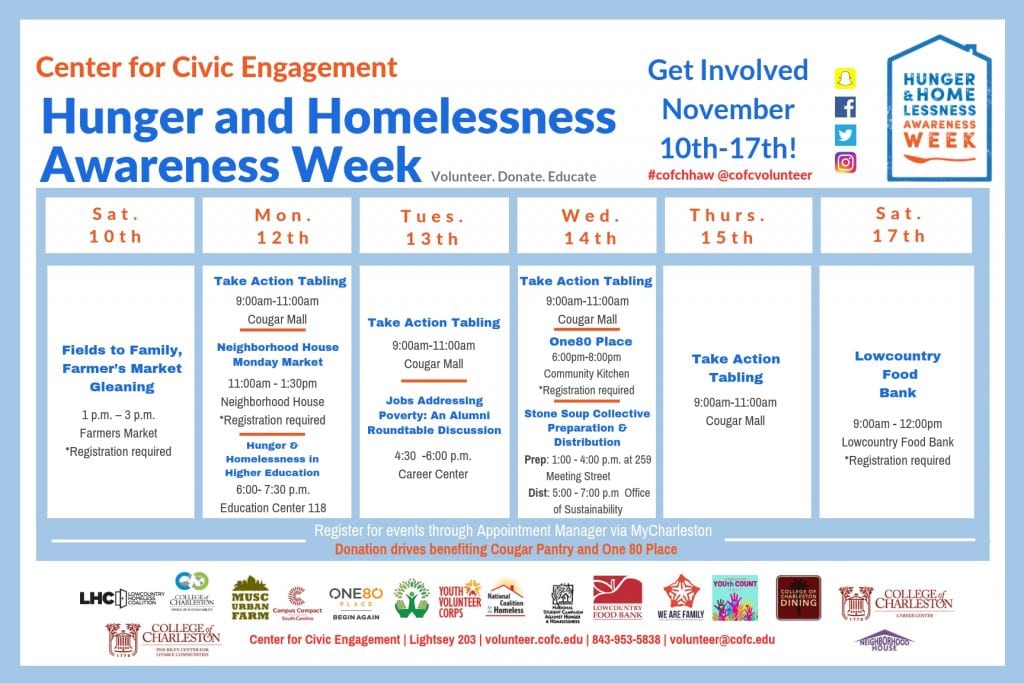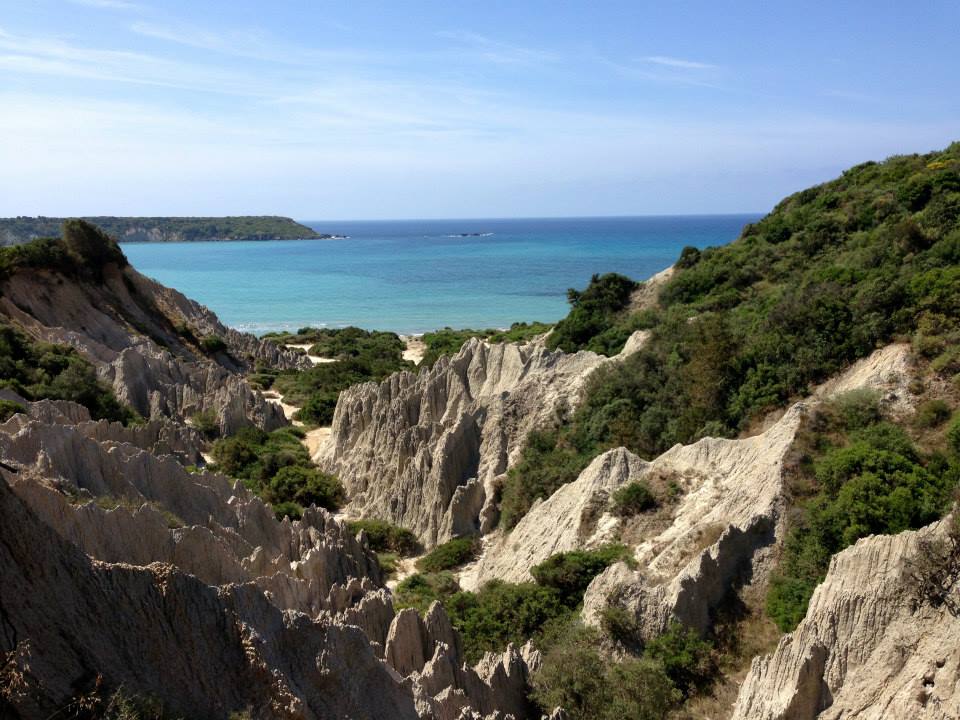Contributions made by Kat Carmichael, Elizabeth Mandell, and Aly Skiko
Over this past fall break, two groups of students decided to get alternative. They wanted to do something different from going home for the weekend. One group strived to learn about the root causes of homelessness and food insecurity in Asheville, North Carolina and one group focused on food insecurity amongst migrant workers on Saint Helena Island located in the Beaufort, SC community.
The group in Asheville worked with several organizations that fought homelessness and food insecurity in the area. These organizations include the Asheville Poverty Initiative, the Steadfast House, the Veterans Restoration Quarters, and the MANNA Food Bank.
The Asheville Poverty Initiative took the group on a tour of Asheville through the eyes of someone experiencing homelessness. They were accompanied by “poverty scholars” (people in poverty that get paid by the organization to give these tours) who shared their stories of living on the streets, and how some local shelters are not all good. This experience provided the participants with a new perspective on homelessness and how the system does not work.
The Steadfast House is a transitional housing facility for women and children experiencing homelessness. Many of the women are victims of domestic violence. Steadfast House also works very closely with the Veterans Restoration Quarters in Asheville. The group learned that in the state of North Carolina boys over the age of 12 are considered too old to reside in Steadfast House, which leads to families needing to be split up.
The Veterans Restoration Quarters provides housing for veterans who experience homelessness when they return from war. One quote that really stuck with the group was how “they trained us for 6 years for war, but only gave us 2 days to readjust.” Veterans are often not given the help they need once they return back to the states, and this often leads to homelessness. The Veterans Restoration Quarters is an all-male facility that accepts only those over 18 years old. In partnership with the Steadfast House, they are working towards building Transformation Village, an organization that would provide housing to any family (including in-tact families and single dads).
The MANNA Food Bank is the largest food bank in Western North Carolina, where 1 in 4 children are food insecure. They provide school kids with “weekend packs” which contain easy to prepare meals for the weekends. Schools often provide students who are food insecure with breakfasts and lunches, but on the weekends the kids go hungry. These weekend packs have meals that the children can prepare themselves.
The Beaufort group focused mainly on educating themselves about the issues that migrant communities face by meeting with different groups connected with the farmworker community during their trip. They first partnered up with Water’s Edge Youth group and went bowling with a group of 12 children who live at the farmworker camps along with other children from Water’s Edge youth congregation.
The next day the group met with Joe Taylor, a local high school teacher who generously teaches youth, evening English classes during his summers off. He works with funds from the migrant education program. Beyond his duties as an ESOL teacher, he and his family are instrumental in connecting the workers to the other resources in the community. He and his daughter Rachel Taylor took the group on a tour of the camps and gave the students an insight into some of the challenges the farmworker families face living in isolated camps. Rachel has worked for the Migrant Education Program alongside her dad, and has also been an intern for SAF, or Student Action with Farmworkers.
The Beaufort group was also fortunate enough to hear from the Migrant Education Program State Recruiter, Zach Taylor. He explained what his position was and what his duties were. He told the group how he aims to find the camps that house farmworkers and their families in the lower part of South Carolina in order to start migrant education programs in the school districts.
Another community member the group met with was a former translator from the Saint Helena Health Clinic. This clinic aims to provide services to the farmworker communities such as OB visits for women who are pregnant, dental services, and even eye exams.
The Beaufort group was able to partner with Water’s Edge church in order to plan fun activities to take the kids to go bowling and to the movies. One day the group went to the camps and brought games and coloring books to play with the children. The Beaufort group also met with the parents of 2 of the children they played with and heard each of their stories. On a separate occasion, the Beaufort group hosted two younger farmworkers at dinner and also heard their experiences as farmworkers.
During their cultural day the group enjoyed Gullah cuisine, the historic Penn Center, downtown Beaufort and Hunting Island State Park. The Penn Center is located on Saint Helena and was the first school for freed slaves in history. During the cultural day, the Beaufort group was able to see Beaufort’s diverse community and fully understand how isolated the migrant community is within Beaufort.
Both groups had incredibly enriching experiences and were able to immerse themselves into the pressing issues that the Asheville and Beaufort communities are facing. These groups will continue to educate themselves and be allies to these communities so the issues they face can eventually be eradicated.
If you are interested in participating in an Alternative Break experience, the applications for Spring Maymester, and MLK weekend breaks are available now! They are due Monday, Nov. 16th to the Center for Civic Engagement by 5pm. Feel free to stop by the office to pick one up, or print out a copy from the Alternative Break page!
 Participants on the Asheville Alternative Fall Break
Participants on the Asheville Alternative Fall Break






